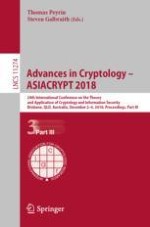2018 | OriginalPaper | Buchkapitel
Optimal Linear Multiparty Conditional Disclosure of Secrets Protocols
verfasst von : Amos Beimel, Naty Peter
Erschienen in: Advances in Cryptology – ASIACRYPT 2018
Aktivieren Sie unsere intelligente Suche, um passende Fachinhalte oder Patente zu finden.
Wählen Sie Textabschnitte aus um mit Künstlicher Intelligenz passenden Patente zu finden. powered by
Markieren Sie Textabschnitte, um KI-gestützt weitere passende Inhalte zu finden. powered by
